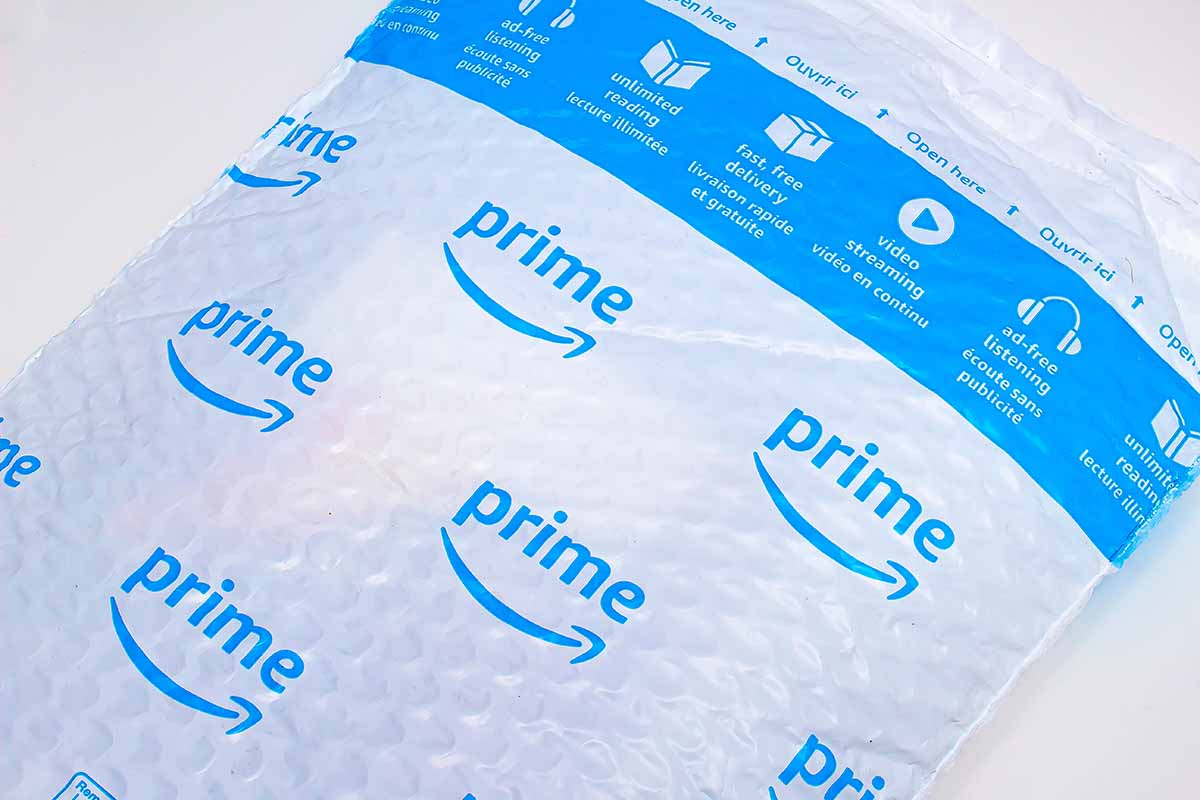
A new study placed Apple AirTag and Android Tile tracking devices in 93 bundles of Amazon’s plastic packaging and tracked where the material ended up. | Oasisamuel/Shutterstock
An investigation that placed tracking devices in bundles of Amazon’s plastic packaging and dropped them off in store collection receptacles around the U.S. found a “failing” drop-off collection system, its authors said. Amazon said it can’t control how material is handled once it enters the recycling system.
The Amazon-focused report, released March 19 and authored by the U.S. Public Interest Research Group and Environment America, is titled “Truth in Recycling: Does Amazon’s plastic packaging actually get recycled?”
Although it takes aim at Amazon’s plastic packaging materials, the U.S. PIRG report is more of an indictment of the plastic film drop-off system in the U.S. It comes on the heels of a similar investigation by ABC News last year, and it comes shortly after the leading directory listing drop-off locations for plastic materials was taken down last year due to funding and concerns about its accuracy.
In the latest report, the authors placed Apple AirTag and Android Tile tracking devices in 93 bundles of Amazon’s plastic packaging, including bags and air pillows, and placed them in store drop-off collection locations. Then they tracked where the material ended up.
Of the 93 tracked bundles, 24 ended up at major PE recycling company Trex, 19 went to store distribution centers, 13 ended up in landfills, 13 never left the store they were dropped off at, eight went to transfer stations or “near multiple disposal sites,” four went to MRFs or other sorting facilities, four died in transit, three made it to a port, two went to an incinerator, and one each went to a composting facility, auto dealer and small freight firm.
“The store drop-off system for recycling plastic film is failing,” the authors wrote, adding it provides evidence contradicting Amazon’s claims about packaging recyclability.
“No matter how much Amazon and others say its packaging is ‘recyclable,’ the truth is that plastic never has been widely recycled and likely never will be,” the report states. “The better approach to plastic packaging is to stop producing and using it.”
In a statement to Plastics Recycling Update, Pat Lindner, Amazon’s vice president of sustainable packaging, pointed to the company’s work with The Recycling Partnership and other projects to improve recycling infrastructure.
“Amazon is continuously reducing packaging waste and working to make recycling easier for customers, however, we do not have control over how packaging is handled once it has been disposed of by municipalities or recycling centers,” Lindner said.
Although the largest portion ended up at Trex, the report considers material that ended up at Trex in the same category as material that was landfilled or incinerated. The report acknowledges there are “some positives to Trex’s products,” but it also criticizes Trex as a “downcycler” for using the plastic in decking materials rather than putting it back into packaging.
It also casts doubt on how much of the post-consumer plastic film dropped off in stores, a major collection source Trex has built up as its NexTrex program, makes it into Trex products due to contamination. Trex uses both post-consumer material and cleaner film from commercial sources like warehouses and back-of-house retail locations.
The report indicates it’s unclear what happened to the 19 bundles that were tracked to store distribution centers or warehouses. “It is possible that the trackers died before the plastic was transferred from the distribution center to a recycler, landfill, Trex, or that the plastic could simply be sitting there with no place to go,” the authors wrote.
The sorting facilities that received four of the tracked bundles were K&S Recycling in Vancouver, Washington, which received two tracked loads from New Seasons grocery stores in Portland, Oregon; Independent Recycling Services of Chicago, which received a tracked load from Tony’s Fresh Market in Chicago; and Polyfit in Tecate, Mexico, a plastics reclaimer that received material from a Sprouts store in Culver City, California.
The report’s authors contacted the two MRFs, which confirmed they didn’t accept plastic film – few U.S. MRFs do – and they couldn’t reach the reclaimer in Mexico.

